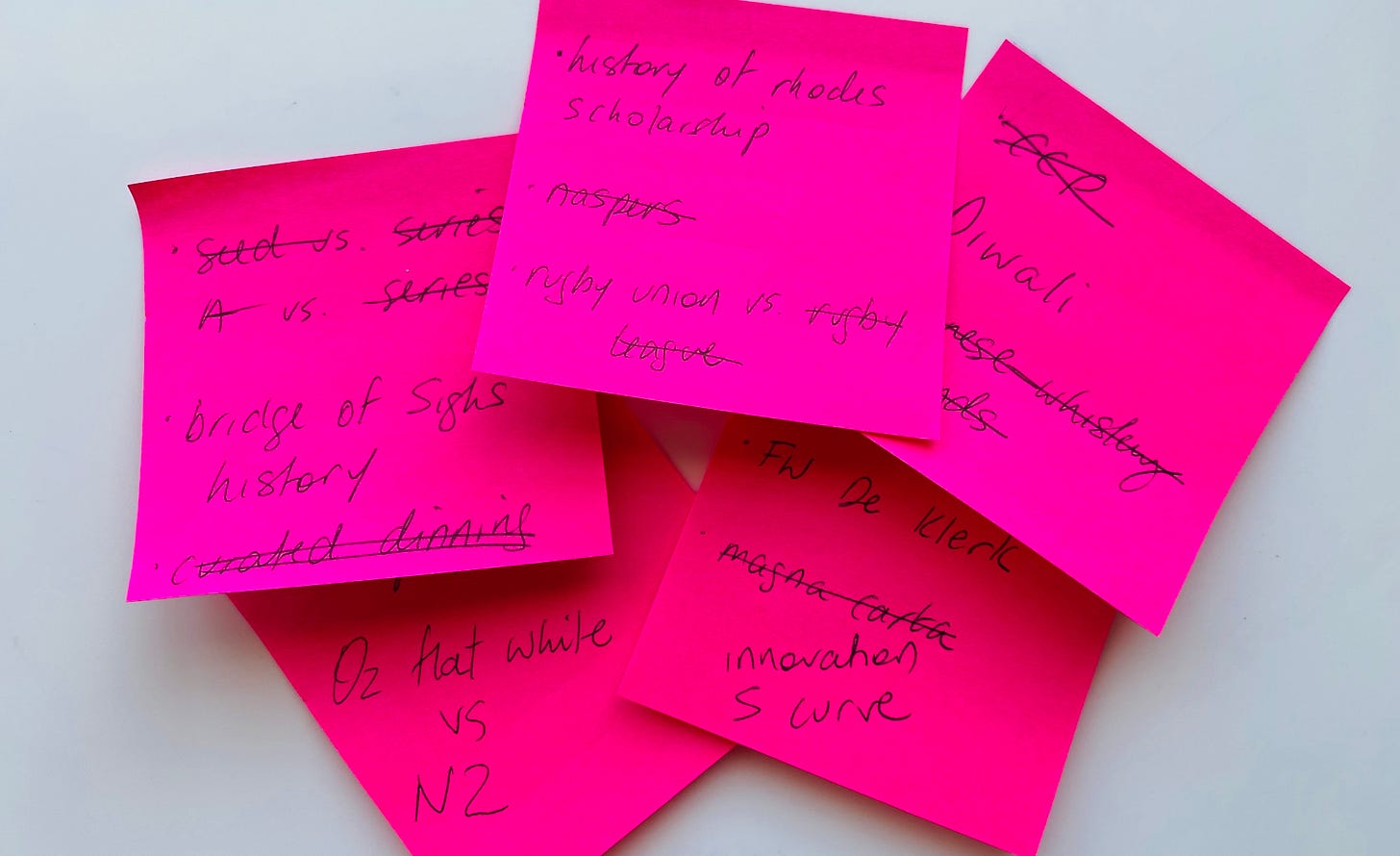How Learning on the Internet Changed My Life
And the launch of LOTI: Your new home for learning on the Internet.
Hey Everyone,
A big welcome back! I’ve never been more excited to hit send on a newsletter.
In today’s post I detail my relationship with learning. How learning on the Internet has changed my life, and why it motivated me to create a new home to learn about learning online.
Let’s get right to it.
Learning on the Internet
We’ve all read the headlines:
Half of today’s jobs will be eliminated by 2025 as a result of technological innovation. (WEF)
1.3 billion people have skills and competencies misaligned with the work they perform. (BCG)
More than 120 million people will need upskilling or re-skilling in the next three years. (Bloomberg)
The new world of work, defined by increased automation, a decentralized global workforce, knowledge-based gig work, and a massive skills gap, has imposed the need for lifelong learning. I believe the internet is the best—possibly the only—place to facilitate lifelong learning and the constant skilling of billions of people. Simply put, the internet is our greatest hope for democratizing lifelong learning and, as a result, lifelong employability.
As I discovered the hard way, mastering learning on the internet is not as simple as mimicking what you know of the offline experience. When I started my online learning journey eighteen months ago, some of the information I needed already existed, but was scattered. Other parts just didn’t exist. There was no place to find a set of courses designed to address my specific learning outcomes. The course creators didn’t have years of pedigree. I put no thought into who to learn with. There was no built-in career counselor to help guide me. Consequently, like a lot of adult learners, I was "drowning in information, but starving for wisdom." (E. O. Wilson)
But, I had one thing. The privilege of time and money to make mistakes. The time to build frameworks that allowed me to think critically about a program’s content, network, and recognition. The means to trial different learning opportunities.
I know that not everybody has the time, or money, or both. That’s why I created LOTI.
I am thrilled to announce the launch of LOTI, a new home empowering adult learners to think critically about how they invest their time and money when learning on the Internet.
But first, how it all started.
Learning in a Thousand-Year-Old College Town
It was September 2013, my first day at the University of Oxford. I arrived on campus ready to learn from some of the top professors—to learn in the classic Oxford tutorial method. To soak up all of the knowledge that only the world's first university could provide.
I quickly realized I would learn more outside the classroom than in it. My MBA classmates, the students I met at the student union, other fellows in my college, and even those I met at the pub, together, would become my greatest gateway to learning. The highlight of many days was walking into the school cafeteria. There, I would regularly encounter students from more than forty countries, from every walk of life, each an emerging master in his or her respective craft.
It turned out the cafeteria, not the classroom, was where I'd learn the most.
The energy of the cafeteria was palpable. My classmates didn’t hold back. If they smelled bullshit, they called bullshit. If I wanted to be a part of the conversation, I had to be ready to defend my opinions with facts, not conjecture. I began keeping a running list of subjects that I wanted to learn more about. This way, when a topic came up, I could participate in the discourse.
That feeling—that energy of learning driven by social connection and community engagement—is what I have been chasing ever since.
Finding That Feeling, Fortuitously.
I discovered that same energy six years later in David Perell’s Write of Passage course. My first Learning-on-the-Internet experience.
Why I joined - I wanted a forcing function to start writing online, a goal I had held for a few years. I wanted to use writing as a way to refine my thoughts around a new startup idea.
What I got - a place to find community and a reinvigoration of my learning being driven by social connection.
I have since participated in six additional online learning journeys. I’ve done a mix of asynchronous courses (Learning how to Learn, Sketch Like an Architect), blended learning courses (Life of Focus), cohort-based courses (Ethics, Public Policy, and Technological Change), and two fellowships (On Deck’s Founder and Foster).
The experience of learning at Oxford is hard to replicate. There is only one library where Tolkien wrote Lord of the Rings, and only one pub that is home to Bill Clinton’s first joint. But learning with the type of people that Oxford attracts, people from all corners of the earth, all walks of life, with extremely diverse perspectives, has now become possible and available to everyone—on the Internet.
So You Want to Learn on the Internet: What You Need to Know
In its purest form, learning on the Internet can be broken down into three nodes.
I call it the CNR cluster:
The Content: The material taught and its expected outcomes.
The Network: The people you meet and work with during the course, (including the instructor), and the accountability they provide.
The Recognition: An access code to specialized and intimate professional networks. A badge that you are part of the (insert course name) alumni network.
For every Internet learner, the priority of each node will differ. But for every learner, knowing the structure of the course is vital to making sure the experience is a success.
My minimum viable considerations (MVC) for investing in a new learning experience:
Creator: What makes the course creator a domain expert? Is the course taught exclusively by them or is it a collective?
Subject Matter: What you are trying to learn and why? (Career advancement, personal development, etc)
Outcomes: Be clear about the outcomes you desire. Make sure they are aligned with the course objectives.
Type: Is it a cohort-based course (CBC), a fellowship, asynchronous, blended, or something else entirely? Understand the differences and which format suits you best.
Length: Is the course time bound or open ended? Be honest with yourself: does a deadline increase your chance for successful completion?
Community: Is the course supported by an active community?
Teaching type: Are the classes live or are they recorded videos? Maybe a combination of the two? Think flexibility vs. accountability here.
Cohort-based: Will you go through the course with the same group of people, at the same time, or are you on your own? Maybe there are a number of people doing the course but at different stages? Again, think flexibility vs. accountability here.
Maturity: Did the course just launch or has the program seen rounds of updates based on previous cohorts?
Cost: Courses range from free to thousands of dollars. Consider the tradeoff between price and the level of commitment paying will create.
Refund Policy: Yes / No
And last, but certainly not least, who will you be learning with?
It is important to consider what type of students the course creator is attracting. Who will be in the trenches with you? What type of community is the creator curating? Remember, even though you come for the creator, you stay for the community. (More on this in an upcoming post)
The Future of Learning (on the Internet)
Access to specific content and teachers, which was once reserved for the few and the privileged, has now been made available for anyone with a smartphone. Experiences once only available in the halls of Ivy League institutions are now readily accessible online. Still, I’ve watched over the last year as the internet learning adoption was concentrated among those who were already well-versed in the language of learning. Internet users who knew where to find the most engaging courses. Internet users who knew the legitimate teachers. Internet users who are already members of networks that provide visibility into this growing virtual world.
If left unchecked, the newest wave of learning on the internet can quickly go the way of what we see in (higher) education today. Or end up mimicking the poor completion rates seen in MOOCs (~5%) and online bachelor programs (~50%). Or increase in price inaccessible to most.
Introducing LOTI
LOTI’s mission is to enable every working-aged individual to maximize the ROI of learning on the internet. By providing objective, fact based information about creators, their courses, their content, and (if applicable) their community, LOTI will save learners time and money, and eliminate the stress of information overload or information deprivation.
Our goal is to empower first time internet learners and failed internet learners. Those who know that lifelong learning is a necessity for staying employable. Those adult learners who I’ve heard say time and again they want to:
Learn a new subject but don't know where to start.
Upskill to land a new job but are not sure which outcomes to prioritize.
Retrain for an existing career but don’t know what to focus on.
Level up existing skills but don’t know which classes to invest in.
Study with others but don’t know what community to trust.
In the same way a Wikipedia page is a comprehensive summary of all branches of information about a specific topic, LOTI intends to do the same for online learning.
LOTI will help individuals optimize the decision-making process by:
Simplifying the language around learning on the internet.
Providing a directory of available courses offered by independent course creators.
Offer guidance to understand the type of course experience best suited for them.
Information on how to leverage the community as part of the learning experience.
Connect the dots between course outcomes and career growth opportunities.
And this is just the start.
If any of this strikes a chord with you, please reach out!
Thanks for coming along.
Yours truly,
David - the Infinite Learner
A big thank you to Richie Bonilla, Tom White, Dani Trusca, Wyatt Smith, Sarah Guo, David Gaynor, Tom White, Pavan Katepalli, Greg Isenberg, Matthew Vere, Michael Zelniker, Nicole Jarbo, Rhishi Pethe, Tom Critchlow, Ayomide Ofulue, Jonah Baer, Linda Chavers, Adam Thomas, Ali Q, Howard Gray, and Alfonso Guerrero-Villa for being so generous with your time and energy, and offering such thoughtful, valuable feedback throughout the process.







Look forward fo seeing what comes of this (all the way from Lima-Peru)